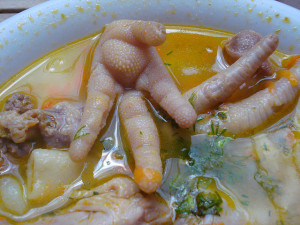Not all memories are good. I grew up in post-war poverty and food shortages, and I remember my sister spitting out a chewy lump of meat and my father saying I could eat it. hen I refused he demonstrated it was fine to eat by eating it himself. Christmas dinners were not happy events. They were always rather fraught, with my mother locking herself tearfully in the bedroom on some occasions. Plans were not made for the shortage of income in December - householders do not usually want the disruption of a decorator in the house in December - so sometimes there wasn't money to pay for Christmas food and presents. Sometimes the food of poverty can bring a happy memory. I remember telling my mother how fondly I remembered eating rice with tomato sauce as a child, and she confessed that this was something she made when she was absolutely desperate and had nothing else to offer.
There were other special occasions though. I remember as a young child my mother bravely making filo pastry from scratch, stretching it out on her rolling pin, to make apple strudel. She must have been inspired by memories of her own mother's cooking. I have a couple of memories of my Italian grandmother and food, which must date to when we visited them in their apartment in via Alcuino in about 1956. One is of eating with her chickens' feet boiled in broth, not so much a delicacy as the food of poverty. Another is of her taking us to a friend's, and their jointly making ravioli from scratch, making and rolling out the dough, making and placing the fillings, covering the whole with another layer of rolled out dough, and then cutting through with a roller. The ravioli were then taken home and cooked for us to eat.
One dish my mother made and wish I still make and enjoy is polenta, served with a topping of finely cut lambs' liver and onions. The polenta is easier to cook now, as I think, like couscous, it is sold partly precooked.
My English grandmother's cuisine was very different. Tour de force was always Sunday lunch, cooked as I remember it in the range in the kitchen. Roast beef, gravy made from the juice with the addition of gravy browning and flour, Yorkshire pudding, roast potatoes and vegetables. With the move to Devon this was not so easy as my grandmother economised on fuel by cooking at consistently lower temperatures, which meant Yorkshire puddings would not rise and pies were often anaemic in appearance even if delicious in taste.
She also made wonderful pies, using the vast quantities of produce she grew. For most of my life this meant sterilising and filling Kilner jars with blackcurrants, blackberries, raspberries and plums. These provided fillings for pies every day throughout the year till fresh fruit was available. Egg custards were large and in pastry lined dishes. Custard was usually supplanted by fresh cream skimmed from the churn in the dairy next to the cows' shippen.
I remember my grandmother regularly making fruit cake to be served daily at teatime, and I still make it myself. She was also punctilious in making her Christmas puddings, and her large, square Christmas cake, complete with grated carrot as well as dried fruit and glacé cherries, both to recipes which we still have and my sister still uses.
She also made homemade wine, but especially bees wine, a culture that was fed daily with sugar and ground ginger that was eventually diluted and bottled in screw-top brown glass bottles and kept in the bathroom, a cold room at the north end of the ground floor off the living room that was once a dairy.
An early memory is of having tea with Battenburg cake with Miss May Holden, the invalid sister of one of my father's customers. This was served by her housekeeper in her kitchen, where there was a curious fret-sawed parrot that balanced with the help of its tail. Miss May lived with her brother in an enormous Victorian mansion owned by their parents in Whalley Range. The brother later filled the house with lots of gay students and enjoyed his life with them. I still eat Battenburg cake and retain my fond memories of that visit.
There was a shop in Hulme that sold nothing but Eccles cakes, freshly baked on the premises. The smell was wonderful when you passed on the 80 or 88 bus, and I still eat Eccles cakes nearly every week, with their buttery flaky pastry and currant-filled interior.










No comments:
Post a Comment